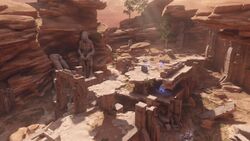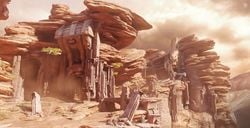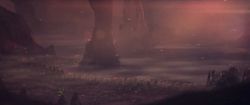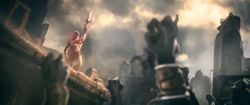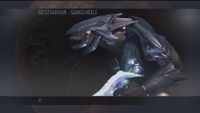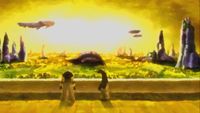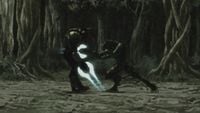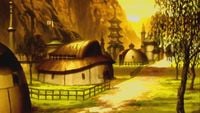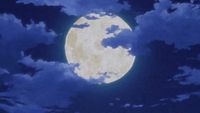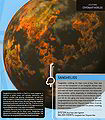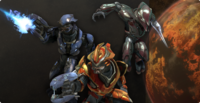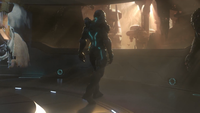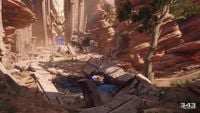Sanghelios
From Halopedia, the Halo wiki
Sanghelios, designated CE-80-9012 d by the Forerunners,[1] is the homeworld of the Sangheili species. Sanghelios is the fourth planet in the Urs system, a triple star system containing Urs, Fied, and Joori. The planet has two moons called Qikost and Suban.[2] As a spacefaring species, the Sangheili have colonized multiple worlds in addition to Sanghelios as they expanded the reach of their own civilization and later the empire of the Covenant.[3]
History
Early history
The Sangheili evolved in tropical wetlands on Sanghelios.[4] Sanghelios had at one point been visited by or had been in contact with the Forerunners, as Forerunner artifacts were left on Sanghelios. During the Forerunner-Flood war and the Lifeworkers' Conservation Measure, the Librarian visited the planet to retrieve specimens of the Sangheili for preservation. After the firing of the Halo Array, the Sangheili preserved aboard the Ark were returned to their homeworld to begin rebuilding their culture.[5]
After being returned to their homeworld, the Sangheili discovered artifacts left by the Forerunners on their planet. The Sangheili revered the objects these "gods" had left, and considered tampering with them a heresy beyond any other. Over time, the Sangheili on Sanghelios developed their technology and became a space-faring race, subsequently colonizing several worlds. At some point, the Clan Battles of Sanghelios occurred on the planet. One of the battles was fought between two large clans in the forest of Tarjak.[6]
The Covenant
In 938 BCE, the Sangheili encountered the Reformist San'Shyuum—a race who also worshipped the Forerunners as gods, but had utilized Forerunner technology for their own needs, believing the technology had been left behind by the gods as gifts for their children.[7] This sparked a war between the two races over how to treat the relics. At first, the Sangheili attempted to keep the San'Shyuum away from Sanghelios and the San'Shyuum were unable to discover the location of the Sangheili homeworld.[8] Part of the war was fought on Sanghelios, with the San'Shyuum's keyship, the Forerunner Dreadnought, devastating military forces planetside. In time, the Sangheili learned of the San'Shyuum's belief in the Great Journey, where the Forerunners used the Halo Array to ascend to a god-like state, and wished to repeat this process on themselves. Coupled with this belief and the fact that the cause of war was obsolete, the Sangheili agreed to unite with the San'Shyuum into an alliance to avoid mutual extinction. In 852 BCE, the two races signed a treaty known as the Writ of Union to form the early Covenant.[9] However, the following year, a civil war began on Sanghelios that would be referred to as the Rending. Several Sangheili opposed the Writ of Union, most notably Ussa 'Xellus. Some Forerunner artifacts were even damaged during the rebellions. In response, Covenant attack fighters were sent to the state of Xellus and destroyed the state and keeps, killing hundreds of Sangheili. This led to Ussa and his clan fleeing to the southern region of Nwari on Sanghelios to plot against the Covenant, though they were eventually forced to flee to The Refuge.[10]
During the Human-Covenant War, many Sangheili warriors from Sanghelios joined the Covenant's campaign against humanity.[11] Many Sangheili manufacturers on and around the planet provided weapons and vehicles for the Covenant. After the Human-Covenant War, the Arbiter Thel 'Vadam returned to Sanghelios.[12] Most Sangheili that served in the Covenant returned to Sanghelios or its colonies when the Covenant was dissolved.[13] The Arbiter was considered by many as the leader of Sangheili that truly abandoned the Covenant. He planned to visit each state to make his case for permanent peace with the humans they had battled for so many years.[14] These reforms did not meet with universal approval. By January 2553, there was great dissent among disparate Sangheili factions, especially from the more devout believers in the Forerunners' divinity. Some, such as Avu Med 'Telcam and his Servants of the Abiding Truth, saw the Arbiter as a traitorous leader that has betrayed their faith and sought to finish their war with humanity.[15]
Post-war
In March 2553, much of the northern hemisphere of Sanghelios became engulfed in a civil war between the Servants of the Abiding Truth and the Swords of Sanghelios loyal to Arbiter Thel Vadam.[16] By 2558, the Arbiter's followers were firmly in control of the planet. Rear Admiral Horatio Temkin served as the UNSC's ambassador to Sanghelios at this time.[17] Recently, a human-Sangheili "librarian" team began to research archived Covenant records on the planet.[1]
In October 2558, the planet would once again become embroiled in conflict as Jul 'Mdama's Covenant faction assaulted Sanghelios. It was at this point that a powerful Forerunner construct known as a Guardian would be encountered on the planet by the Swords of Sanghelios and Fireteam Osiris led by Jameson Locke.[18]
Topography
Sanghelios has a gravity of 1.375 Gs, and an average surface temperature of -5°C to 96°C (23°F to 204.8°F). The Forerunners' Bestiarum indicates that Sanghelios is similar to Earth in shape and proportion, though the land masses and multiple continents are more scattered in relation to bodies of water. Known continents on the planet include Kaepra, Qivro, Tolvuus, and Yermo. There is a large variation of vegetation and temperature on the planet. Sanghelios' sky varies in hue from a bright yellow to a blood red, due to large amounts of suspended particles in the upper atmosphere.[19] Like Earth, its atmosphere consists of oxygen, argon, and nitrogen, but also has a reddish hue to it, perhaps indicating large amounts of hematite or molten rock. The saline oceans are tinted red.[20] Frigid winds from the south pole of Sanghelios were spread across the southern regions of the planet.[21] A harsh planet, Sanghelios is located on the innermost edge of the Urs system's habitable zone.[22]
Many Forerunner artifacts and structures exist on the planet, which are the topic of worship, as well as the cause of historical wars between the Sangheili and the San'Shyuum before the formation of the Covenant.[2] Outside the cities, some of which feature towering structures of both classic Sangheili and Covenant-era designs,[23][24] Sanghelios' landscape has stayed mostly unchanged for several millennia; the terrain is mostly agricultural, and the keeps mostly follow ancient, pre-Covenant architectural styles.[25] The large size of Sanghelios' two natural satellites—Qikost and Suban—had great effects on the planet's tides.[26]
Locations
Ground locations
Orbital locations
Ecology
Sanghelios is home to numerous animal and planet species, widely different from those on Earth. Some of these animals are domesticated, like the colo which is farmed across Sanghelios for its meat.[27] Doarmir are furry animals that are hunted for their fur, which is used for clothing.[28] Helioskrills are large, predatory creatures that live in the mountains of Sanghelios, respected by the Sangheili for their hunting positions.[29] Intestinal parasites—nishum—are common pests on the planet.[30] The waters on Sanghelios are home to large, predatory aquatic cephalopods that prey on unsuspecting creatures that wander into their territory. The skies of Sanghelios are often filled with a variety of avian-like animals.[31] Sangheili farmers would train predatory animals, known as the quillick, to hunt mammals for them.[32] 'sKelln are leather-winged predatory animals capable of flight.[33] Thremaleon were a vicious, nearly extinct, species of lizard that the Sangheili would use for leather.[34] There are also small, rat-like creatures that live on the planet, hunted by adolescent Sangheili.[35]
The planet is also home to numerous types and varieties of vegetation. Irukan is commonly grown on the planet, usually by Kig-Yar.[36] Kafel is a plant with a durable, wooden trunk that is often used in Sangheili construction.[37]
Government and society
By 2552, Sanghelios was inhabited by 8.132 billion Sangheili.[2] As with the nature of Sangheili governments in general, Sanghelios has no global capital and most of the planet's inhabitants live in states led by and named after a particular Sangheili family.[38][39] A given state is governed by a single clan residence and assembly house known as a keep, headed by a kaidon selected by a council of elders. There are usually a number of "client keeps" belonging to different clans under the leading keep's rule,[40] though a state's elders will assume the kaidon's clan name as a title signifying their position, regardless of the name of their own family keep.[25] The states on Sanghelios vary greatly in size and wealth, ranging from small, rural ones like Mdama to urban city-states like Ontom, which mix old Sangheili architecture and modern, Covenant-era structures.[24]
Sanghelios was once led by an Arbiter, a title that was part king and part judge.[41] During the early years of the Covenant, Sanghelios was governed by the Council of City States.[42] Those who committed crimes against the government may have been allowed to fight to the death in an arena. During the Sangheili's long service with the Covenant, the Covenant had a large presence on the planet.[43] Clans and cities were allowed to develop in isolation, but any individual who renounced Sanghelios or rebelled against the government could face imprisonment or execution.[44] After the dissolution of the Covenant, Unggoy and Jiralhanae laborers continue to live on the planet as workers for the Sangheili, and Kig-Yar merchants often visit to trade with the planet's inhabitants.[45]
Notable residents
- Fal 'Chavamee
- Haka
- Han 'Chavamee
- Thel 'Vadam
- Usze ‘Taham
- Toha ‘Sumai
- Rtas 'Vadum
- Avu Med 'Telcam
- Jul ‘Mdama
- Levu 'Mdama
- Forze 'Mdama
- Raia 'Mdama
Trivia

|
Browse more images in this article's gallery page. |
- The name "Sanghelios" comes from the Latin sanguis and the Greek helios meaning "Blood-Sun". It is implied that this may refer to the emphasis on blood in the culture of the warrior Sangheili that live there.
- The Doctor Who episode "Planet of the Dead" features a planet called San Helios, which is also part of a triple star system.[46]
- In Halo: The Cole Protocol, Sanghelios is mistakenly referred to as "Sanghelion" in chapter headings.[47]
Gallery
Sanghelios as seen in the Bestiarum.
A duel between Fal 'Chavamee and a rivaling Sangheili in forest terrain on Sanghelios.
Relatively old Sangheili architecture (circa 2152).
The future Shipmaster of the Fleet of Righteous Vigilance, duelling with a fellow clanmate on Sanghelios.
An unknown aquatic creature which inhabits Sanghelios. It is currently preying upon a Sangheili submerged within water.
Sanghelios from the Halo Encyclopedia.
Agent Jameson Locke on Sanghelios.
A UNSC D79-TC Pelican over buildings on Sanghelios.
List of appearances
- Halo 3 (First mentioned)
- Bestiarum (First appearance)
- Halo: The Cole Protocol
- Halo Legends
- Halo: Evolutions - Essential Tales of the Halo Universe
- The Return (Motion comic only)
- Halo: Blood Line
- Halo: Glasslands
- Halo: The Thursday War
- Halo: Mortal Dictata (Mentioned only)
- Halo: Broken Circle
- Halo 2 Anniversary
- Halo: Hunters in the Dark
- Halo 5: Guardians
Sources
- ^ a b Waypoint: Catalog Interaction page 14
- ^ a b c Halo 3, Bestiarum
- ^ Eleventh Hour reports, Report 2
- ^ Halo: Broken Circle, page 38
- ^ Halo Legends, Origins
- ^ Halo: Broken Circle, page 30
- ^ Halo: Contact Harvest, page 147
- ^ Halo: Broken Circle, page 58
- ^ Halo Encyclopedia, page 30
- ^ Halo: Broken Circle, page 37
- ^ Halo Encyclopedia, page 145
- ^ Halo 3, campaign level Halo
- ^ Halo: Broken Circle, page 265
- ^ Halo: Glasslands, page 130
- ^ Halo: Glasslands, pages 58-61
- ^ Halo: The Thursday War
- ^ Halo: Escalation, issue 5
- ^ YouTube: Halo 5: Guardians – Swords of Sanghelios Gameplay Capture
- ^ Halo Encyclopedia, page 311
- ^ Halo: Glasslands, page 354
- ^ Halo: Broken Circle, page 35
- ^ Halo Encyclopedia, page 130
- ^ Halo: Broken Circle, page 47
- ^ a b Halo: Glasslands, page 135-136
- ^ a b Halo: Glasslands, page 57
- ^ Halo: The Cole Protocol, page 90
- ^ Halo: The Thursday War, page 205
- ^ Halo: The Cole Protocol, page 159
- ^ Halo: The Cole Protocol, page 188
- ^ Halo: The Thursday War, page 79
- ^ Halo: The Thursday War, page 261
- ^ Halo: Broken Circle, page 25
- ^ Halo: Broken Circle, page 36
- ^ Halo: Broken Circle, page 90
- ^ Halo: The Flood, page 5
- ^ Halo: The Thursday War, page 62
- ^ Halo: The Cole Protocol, page 89
- ^ Halo: The Cole Protocol, page 93
- ^ Halo: Glasslands, page 58
- ^ Halo: Glasslands, page 94
- ^ Halo 2 Anniversary, Terminals
- ^ Halo: Broken Circle, page 26
- ^ Halo: Broken Circle, page 174
- ^ Halo: Broken Circle, page 125
- ^ Halo: Glasslands, page 134
- ^ San Helios at TARDIS Index File, Doctor Who wiki
- ^ Halo: The Cole Protocol, pages 88, 349
